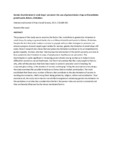Please use this identifier to cite or link to this item:
https://cris.library.msu.ac.zw//handle/11408/1702Full metadata record
| DC Field | Value | Language |
|---|---|---|
| dc.contributor.author | Maruzani, Nyevero | - |
| dc.date.accessioned | 2016-07-19T14:07:43Z | - |
| dc.date.available | 2016-07-19T14:07:43Z | - |
| dc.date.issued | 2013 | - |
| dc.identifier.uri | http://www.aessweb.com/pdf-files/669-681.pdf | - |
| dc.identifier.uri | http://hdl.handle.net/11408/1702 | - |
| dc.description | Abstract | en_US |
| dc.description.abstract | The purpose of this study was to examine the factors that contribute to gender discrimination in retail shops, focusing on general dealer shops at Murambinda Growth point in Buhera, Zimbabwe. Despite the fact that policy makers continue to grapple with possible strategies to promote and advance progress towards equal opportunities for women, gender discrimination in retail shops still exists. Recent research also shows that workplace discrimination continues to be an impediment to gender equality. Women, who bear the disproportionate burden of the world’s poverty, continue to face systematic discrimination in areas of employment, healthcare and education. This discrimination is quite significant in increasing poverty levels among women as it makes it more difficult for women to sustain livelihoods .It is from that premise that the study sought to find out why, after all the advances that have been made in women’s education and in breaking the corporate glass ceiling, is the situation of women unchanging? Using the descriptive survey design, the study examined the possible limitations on female labour market participation. The study established that there are a number of factors that contribute to the discrimination of women in working environments, chief among them being patriarchy, religion, culture and socialisation. Over and above all, the study recommends that all efforts targeted at addressing gender discrimination in the workplace must take into consideration the fact that gender roles are socially constructed and they are heavily influenced by the above mentioned factors. | en_US |
| dc.language.iso | en | en_US |
| dc.publisher | Asian Economic and Social Society | en_US |
| dc.relation.ispartofseries | International Journal of Asian Social Science;Vol. 3, No. 3: p. 669-681 | - |
| dc.subject | Gender, Gender discrimination, Patriarchy, Retail shops, Socialisation patriarchy | en_US |
| dc.title | Gender discrimination in retail shops’ personnel: the case of general dealer shops at Murambinda growth point, Buhera, Zimbabwe | en_US |
| dc.type | Article | en_US |
| item.cerifentitytype | Publications | - |
| item.languageiso639-1 | en | - |
| item.grantfulltext | open | - |
| item.openairecristype | http://purl.org/coar/resource_type/c_18cf | - |
| item.openairetype | Article | - |
| item.fulltext | With Fulltext | - |
| Appears in Collections: | Research Papers | |
Files in This Item:
| File | Description | Size | Format | |
|---|---|---|---|---|
| Maruzani N..pdf | 217.3 kB | Adobe PDF |  View/Open |
Page view(s)
66
checked on Nov 29, 2024
Download(s)
4
checked on Nov 29, 2024
Google ScholarTM
Check
Items in MSUIR are protected by copyright, with all rights reserved, unless otherwise indicated.



